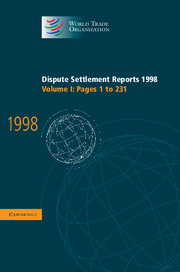Book contents
- Frontmatter
- Contents
- European Communities - Regime for the Importation, Sale and Distribution of Bananas, complaints by Ecuador, Guatemala, Honduras, Mexico and the United States (WT/DS27): Award of the Arbitrator under Article 21.3(c) of the DSU
- India - Patent Protection for Pharmaceutical and Agricultural Chemical Products, complaint by the United States (WT/DS50): Report of the Appellate Body
- India - Patent Protection for Pharmaceutical and Agricultural Chemical Products, complaint by the United States (WT/DS50): Report of the Panel
- European Communities - Measures Concerning Meat and Meat Products (Hormones), complaints by the United States (WT/DS26) and Canada (WT/DS48): Report of the Appellate Body
European Communities - Measures Concerning Meat and Meat Products (Hormones), complaints by the United States (WT/DS26) and Canada (WT/DS48): Report of the Appellate Body
Published online by Cambridge University Press: 24 July 2020
- Frontmatter
- Contents
- European Communities - Regime for the Importation, Sale and Distribution of Bananas, complaints by Ecuador, Guatemala, Honduras, Mexico and the United States (WT/DS27): Award of the Arbitrator under Article 21.3(c) of the DSU
- India - Patent Protection for Pharmaceutical and Agricultural Chemical Products, complaint by the United States (WT/DS50): Report of the Appellate Body
- India - Patent Protection for Pharmaceutical and Agricultural Chemical Products, complaint by the United States (WT/DS50): Report of the Panel
- European Communities - Measures Concerning Meat and Meat Products (Hormones), complaints by the United States (WT/DS26) and Canada (WT/DS48): Report of the Appellate Body
Summary
INTRODUCTION: STATEMENT OF THE APPEAL
The European Communities, the United States and Canada appeal from certain issues of law and legal interpretations in the Panel Reports, EC Measures Concerning Meat and Meat Products (Hormones). These two Panel Reports, circulated to Members of the World Trade Organization (“WTO“) on 18 August 1997, were rendered by two Panels composed of the same three persons.2 These Panel Reports are similar, but they are not identical in every respect. The Panel in the complaint brought by the United States was established by the Dispute Settlement Body (the “DSB“) on 20 May 1996. On 16 October 1996, the DSB established the Panel in the complaint brought by Canada. The European Communities and Canada agreed, on 4 November 1996, that the composition of the latter Panel would be identical to the composition of the Panel established at the request of the United States.
The Panel dealt with a complaint against the European Communities relating to an EC prohibition of imports of meat and meat products derived from cattle to which either the natural hormones: oestradiol-17ß, progesterone or testosterone, or the synthetic hormones: trenbolone acetate, zeranol or melengestrol acetate (“MGA“), had been administered for growth promotion purposes. This import prohibition was set forth in a series of Directives of the Council of Ministers that were enacted before 1 January 1995. Those Directives were:
1. Council Directive 81/602/EEC of 31 July 1981 (“Directive 81/602“);
2. Council Directive 88/146/EEC of 7 March 1988 (“Directive 88/146“); and
3. Council Directive 88/299/EEC of 17 May 1988 (“Directive 88/299“).
Directive 81/602 prohibited the administration to farm animals of substances having a hormonal action and of substances having a thyrostatic action. It also prohibited the placing on the European market of both domestically produced and imported meat and meat products derived from farm animals to which such substances had been administered. Two exceptions to this prohibition were provided for. One exception covered substances with an oestrogenic, androgenic or gestagenic action when used for therapeutic or zootechnical purposes and administered by a veterinarian or under a veterinarian's responsibility.
- Type
- Chapter
- Information
- Dispute Settlement Reports 1998Volume I: Pages 1-231, pp. 135 - 231Publisher: Cambridge University PressPrint publication year: 2000
- 1
- Cited by



